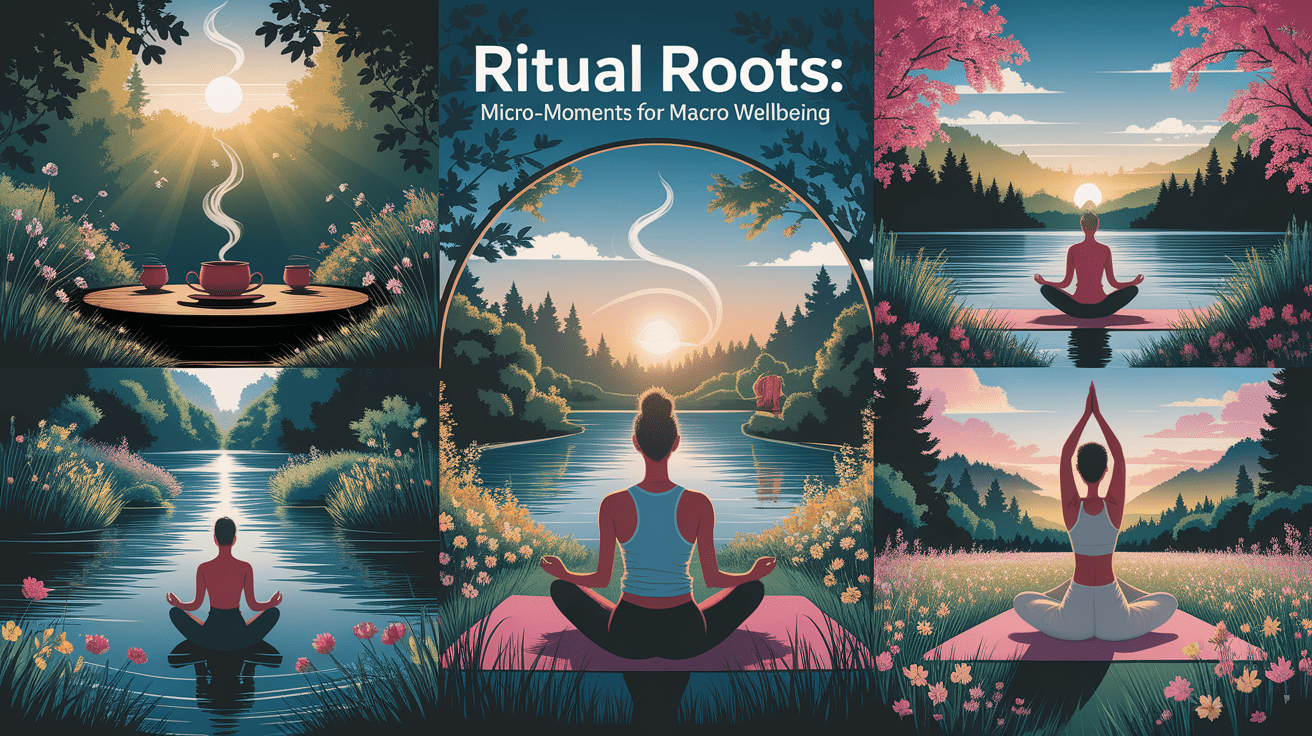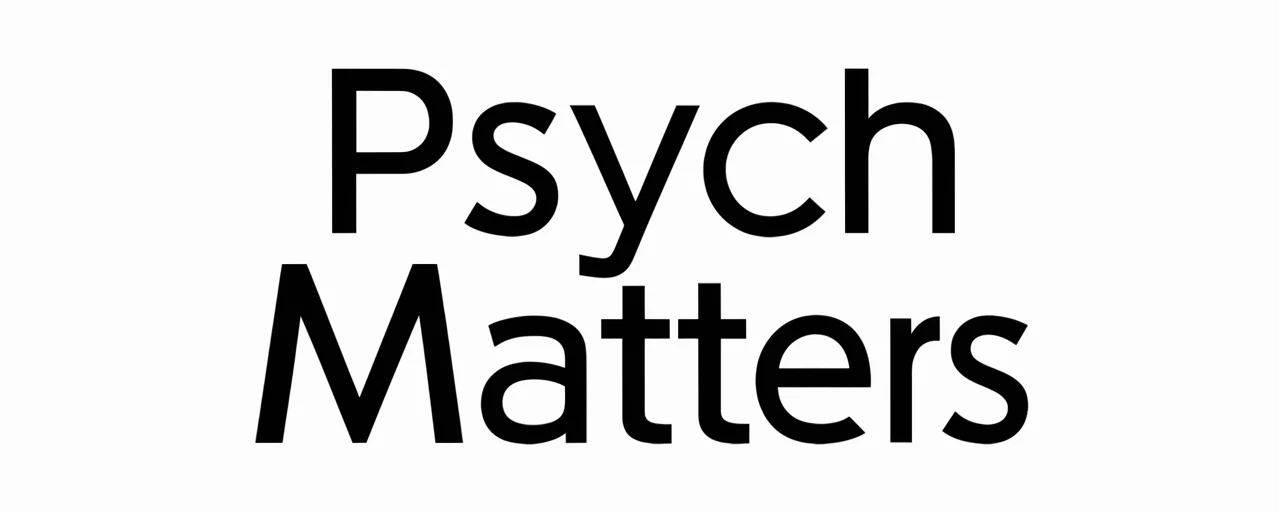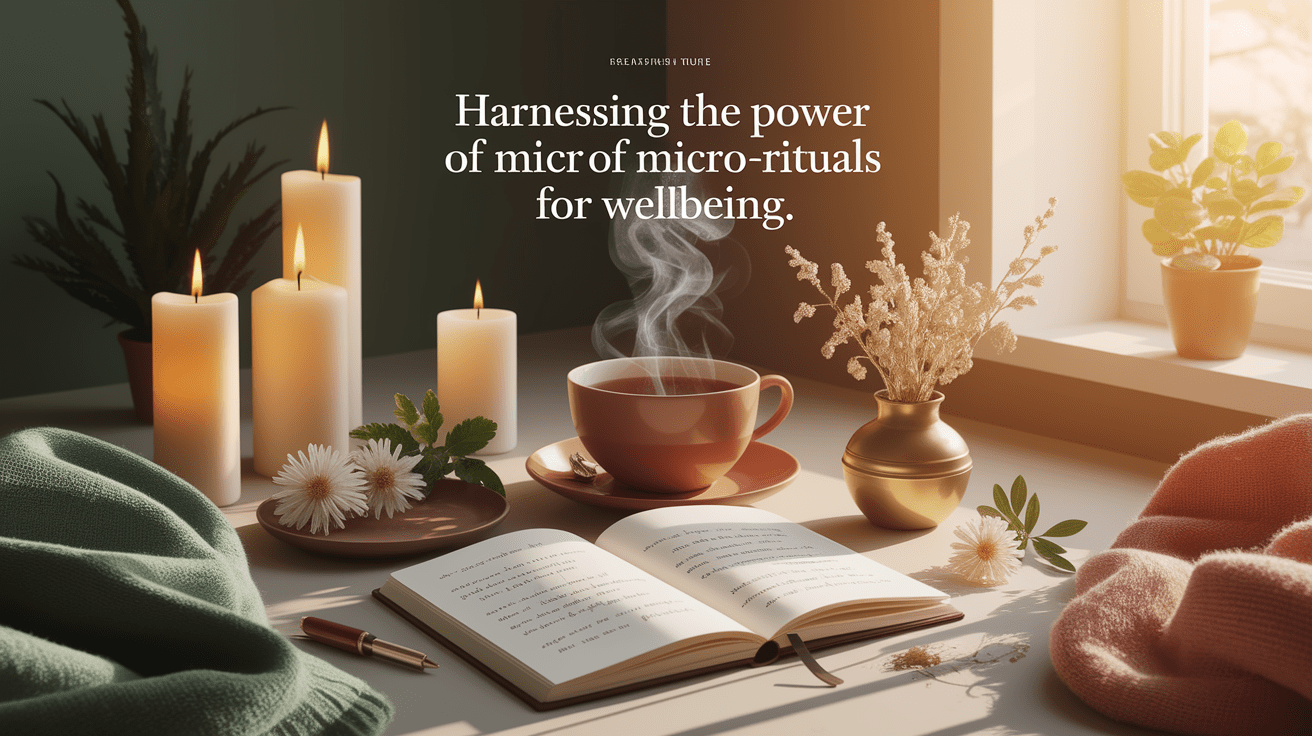Harnessing the Power of Micro-Rituals for Wellbeing
Ritual Roots: Micro-Moments for Macro Wellbeing
In psychology, rituals are defined as behaviors characterized by rigid, repetitive sequences that often carry symbolic meaning. These actions can be physical (e.g., specific movements) or meaning-based, influencing human experience through both bottom-up and top-down processes, as described in Hobson et al.’s review on the psychology of rituals. Within this spectrum lies the concept of micro-rituals—small, intentional routines embedded in daily life.

Unlike larger or ceremonial rituals, micro-rituals are brief but consistent actions that provide structure, enhance emotional regulation, and support overall wellbeing. They offer predictability, instill a sense of control, and serve as grounding anchors amidst the unpredictability of daily life.
The Psychology Behind Micro-Rituals
Micro-rituals influence mental and emotional states by drawing on the same psychological mechanisms as larger rituals. Repetition and symbolic meaning create stability, reduce cognitive load, and help regulate emotions. According to research on rituals as buffers against distress, these behaviors mitigate fear and anxiety by creating a structured framework, even in uncertain contexts.

Psychological theories suggest three key pathways:
- Regulation of Arousal: Predictable actions help calm the nervous system, reducing “fight-or-flight” activation.
- Cognitive Anchoring: Rituals serve as mental anchors, lowering decision fatigue and improving focus.
- Social Bonding: Shared or witnessed micro-rituals enhance feelings of belonging and collective identity.
As noted by science-based discussions on rituals, regular engagement in these small practices can shift hormonal balances toward states associated with relaxation, contributing to improved mental health over time.
Everyday Micro-Rituals for Stress Relief
Micro-rituals can be potent stress management tools when strategically integrated into daily life. Their repetitive and structured nature offers an immediate sense of grounding during emotionally turbulent moments.

- Morning Breathwork: Two minutes of deep breathing upon waking to stabilize mood.
- Gratitude Check-ins: Writing down three positives each day can shift focus toward strengths and resources.
- Tea or Coffee Pause: Preparing and savoring a warm drink as a mindful break during work.
- Evening Reflection: Brief journaling before bed to process events and release mental tension.
Studies indicate that predictable wellness routines, even when brief, create feelings of safety and control that buffer against daily stressors (CreateMeFree insights).
Micro-Rituals to Boost Focus and Performance
Within positive psychology and performance science, small behavioral cues can prepare the brain and body for optimal functioning. Micro-rituals target pre-task readiness, enhancing mental clarity and goal-directed focus:

- Workspace Reset: Tidying your desk before starting work can serve as a signal to enter a productive mindset.
- Pre-Performance Visualization: Spending one minute imagining task success primes the brain’s reward systems.
- Micro-Movements: Standing and stretching every 45 minutes supports physical and mental alertness.
These behavioral interventions can stabilize attentional states and create consistent conditions for productivity.
Social Micro-Rituals: Tiny Acts of Connection
From a sociocultural perspective, rituals act as social glue, fostering shared meaning and reinforcing interpersonal bonds. Social micro-rituals can be as simple as greeting colleagues with a specific phrase or having a daily check-in with a loved one. These shared patterns generate “collective effervescence”—a surge of positive emotional energy that supports belonging and relational stability.

- Morning Group Messages: Sending uplifting quotes or updates in a team chat.
- Shared Meals: Eating lunch with colleagues at a set time to build camaraderie.
- Weekly Friend Call: Scheduling a short, consistent catch-up to maintain social closeness.
Building Your Personalized Micro-Ritual Toolbox
Creating a tailored set of micro-rituals involves assessing personal goals, lifestyle constraints, and stress triggers. This process parallels strategies in habit formation and cognitive behavioral therapy, emphasizing gradual integration and reinforcement.
- Identify Needs: Clarify whether the aim is stress relief, focus, connection, or emotional balance.
- Start Small: Choose one or two micro-rituals to integrate without overwhelming daily flow.
- Set Cues: Link rituals to existing habits (e.g., meditate right after brushing teeth).
- Review and Adjust: Adapt based on shifting needs and outcomes.
Maintaining flexibility prevents rituals from becoming rigid constraints, ensuring they remain supportive rather than burdensome.
Small Steps, Lasting Wellbeing: Your Micro-Ritual Journey
Micro-rituals demonstrate that significant improvements in wellbeing and mental health can emerge from subtle, intentional behaviors. By combining psychological insights with practical daily habits, individuals can create stable anchors that reduce stress, sharpen focus, and nurture social bonds. Over time, these repeated actions embed themselves within one’s identity, reinforcing both psychological resilience and emotional balance.







